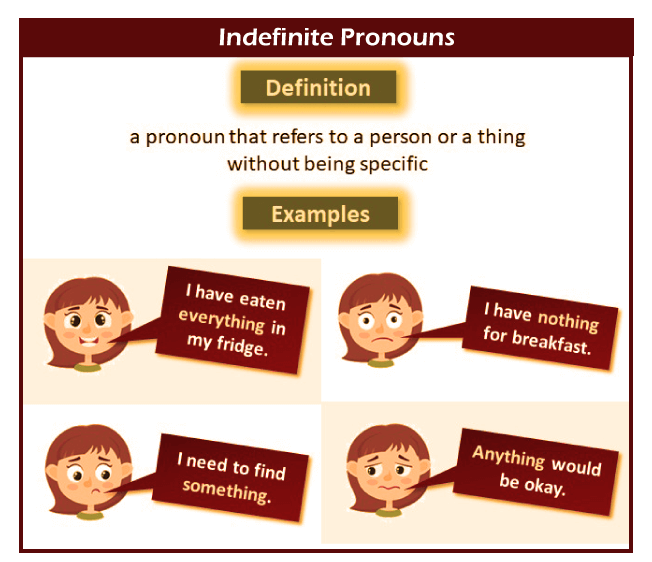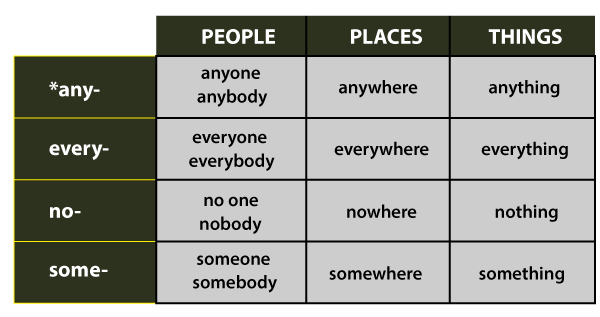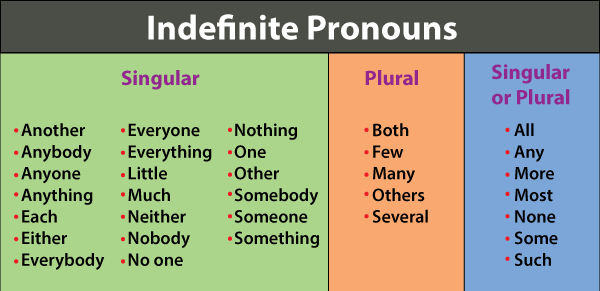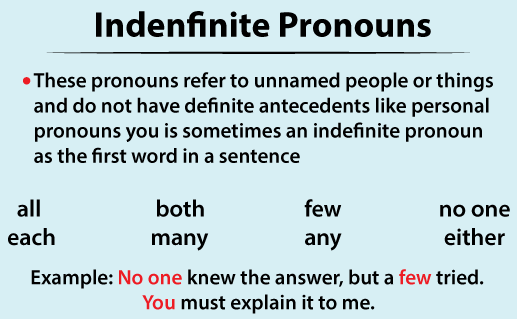Indefinite PronounsNouns are essential words that relate to persons, places, objects, and concepts. When nouns require to be substituted, they ask pronouns to replace and take place for them. Pronouns can perform all of the functions of nouns, such as serving as subjects or objects in phrases. But, there is one form of the pronouns that does not appear to be particularly eager to do its function: the indefinite pronoun. Indefinite pronouns substitute in a broad or general sense rather than providing particular, solely related to the terms. 
In wishy-washy statements like "Someone was outside" or "I can offer you some cash because I have enough," indefinite pronouns are responsible parties. Who basically is someone? How much is enough? We simply don't know! While indefinite pronouns do not want to inform us much, they have a lot more to say. Indefinite pronouns are those that do not allude to a particular individual, location, or item. There is a specific category of indefinite pronouns in English that are created along the quantifiers or distributive followed by terms like any, some, every, and no. What exactly is an indefinite pronoun?An indeterminate pronoun is one that does not specify to whom or what it refers to. In the line, someone ate the final piece of cake; for instance, the phrase someone is an indefinite pronoun. We understand that the pronoun someone relates to a person or a human being, but we know nothing else about them. Indefinite pronouns relate to an individual or object in a broad or generic sense.</p> Indefinite pronouns can be used in a range of contexts. Among them are the following:
When we employ indefinite pronouns, we might also want to limit things down a little bit. To accomplish this, people employ prepositional phrase or dependent clause to clarify the definition of indefinite pronouns and what is really refers to:
Indefinite Pronouns ListIndefinite pronouns can be singular, plural, or any combination of the two. Singular Indefinite PronounsThe indefinite pronouns mentioned here are normally regarded as singular. When employed in a phrase, these terms are usually followed by a singular verb: another, anybody, anyone, anything, each, either, enough, everyone, everybody, everyone, everything, less, little, much, neither, nobody, no one, nothing, one, other, somebody, something, someone. Indefinite Plural PronounsThe indefinite pronouns which are considered as plural are given below. When employed in phrases, these nouns are usually followed by a plural verb: Both, a few, fewer, many, others, several 
Pronouns That Are Indefinite and Can Be Singular Or PluralThe below indefinite pronouns can be singular or plural depending on the context. The verb they employ will be determined by whether these terms are singular or plural: All, any, more, most, none, some, and such
Indefinite pronouns with some and any are often in the similar way as some, and any have been employed alone to express indefinite and incomplete amounts. Indefinite pronouns are inserted in the same spot in the phrase where a noun would be. Now let us see this, below are a few sentences in noun, and then the same set of statements have been substituted with indefinite pronouns. NounThey would love to go to France this holiday. Jim gifted me this novel. I won't disclose your secret to Samy. I purchased my craft items at the store. Indefinite PronounThey would love to go somewhere this holiday. Someone gifted me this novel. I won't disclose your secret to anyone. I purchased everything at the store. What Is The Distinction Between Indefinite Pronouns And Indefinite Adjectives?When a term such as all, any, anyone, and so on are employed as an adjective, it is referred to as an indefinite adjective. (The indefinite pronoun is highlighted in the instances below.) All in the reception area should sit up. (This is an indefinite pronoun.) All staff in the reception area should sit up. (This is an indefinite adjective. It alters the word "staff.") Please deliver some to Mrs. Perry. (This is an indefinite pronoun) Please deliver some oranges to Mrs. Perry. (This is an indefinite adjective. It changes the word "oranges.") Indefinite Pronouns: How to Use ThemLike most other pronouns, Indefinite pronouns are only employed in the same manner that nouns may. Indefinite pronouns can thus operate as both a subject and an object in a statement. Subject: No one understands what to do. Object: He was on the call with someone. Meanwhile, several words for use as indefinite pronouns can also be employed as another component of speech. When a term is used as a modifier, it may be categorized as an adjective or an adverb instead of an indefinite pronoun: Pronoun: Some of us were there last afternoon. (Functioning as a noun.) Adjective: I noticed some shift on the ground. (A noun is being modified.) Adverb: Around 400 participants visited the hall (Adjective is modified in the statement) Proper Usage of Indefinite PronounsThe most important factor to bear in mind while employing indefinite pronouns is that they follow the subject-verb agreement. If the indefinite pronoun is used as a singular pronoun, it should be followed by a single verb. Similarly, if a pronoun is interpreted as plural, it should be accompanied by the plural verb. Correct: one of us was concealing things. Incorrect: One of us was concealing things. Correct: Both of the celestial bodies have rings. Incorrect: Both of the celestial bodies have rings. Things get complicated when it relates to indefinite pronouns, which might be solitary or multiple based on circumstances. To determine if a pronoun is singular or plural, consider what it is referring to. If it is implying to the singular nouns, use the singular verbs. Use a plural verb when alluding to the plural noun. 
Singular: Most of the test is open-ended. (The singular noun is test.) Plural: Most of the leaves are clean. (Leaves are a plural noun.) Keep an eye out for collective nouns, as these are nouns that relate to a group of persons or objects as a whole. A single noun should be used if a collective noun is utilized to allude to an entire community as a cohesive entity. If the collective noun is being used to refer to specific members of the group, use a plural noun. Singular: Some members of the group are absent. (Not all members are present.) Plural: Some of the groups are doing training exercises. (Certain persons are carrying out drills.) None as The Indefinite PronounBecause none typically signifies "not one" or "not any," it is frequently followed by a singular verb: None of us is familiar with the truth. (Not one of us knows the truth.) None of the Maggi is left. (Not any of the Maggi is left.) On the other hand, none is entirely appropriate when used with a plural verb to signify "no individuals" or "no objects." As an example, The evil monarch made many commitments, but none of them were kept. (There were no commitments kept.) When I went to the carnival this afternoon, there were 17 clowns. None were there when I went in the early evening. (There were no clowns in the evening) 
Indefinite Pronoun ExamplesLet's have a glance at how indefinite pronouns are used in statements. Singular Indefinite Pronouns
Indefinite Plural Pronouns
Indefinite Pronouns, Singular or Plural
Indefinite Pronouns as Questions
Thus this concludes our chapter on Indefinite pronouns. It is advisable to use and practice perfect grammar usage regularly.
Next TopicInterrogative Pronouns
|
 For Videos Join Our Youtube Channel: Join Now
For Videos Join Our Youtube Channel: Join Now
Feedback
- Send your Feedback to [email protected]
Help Others, Please Share










